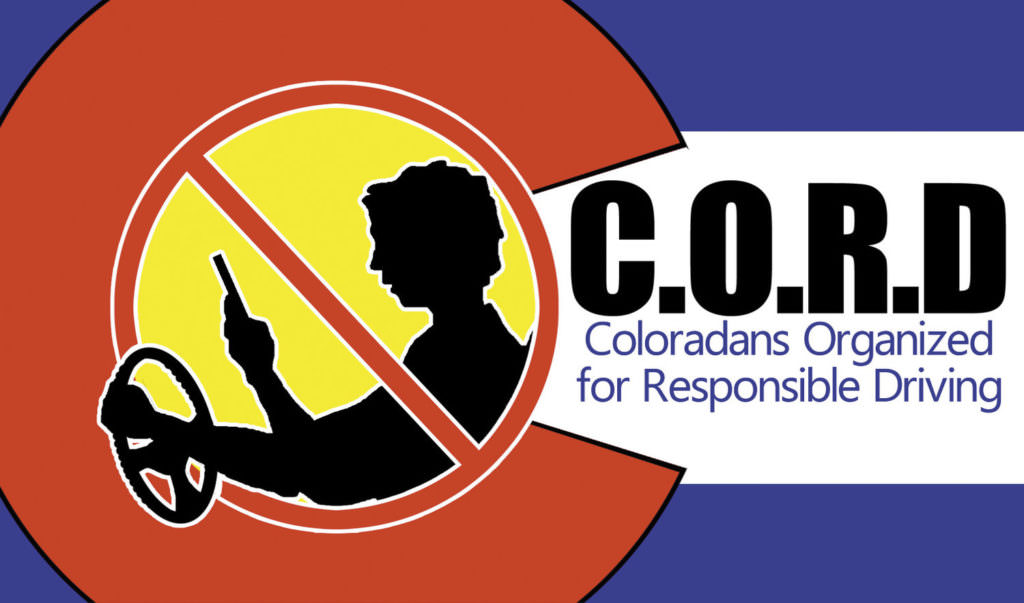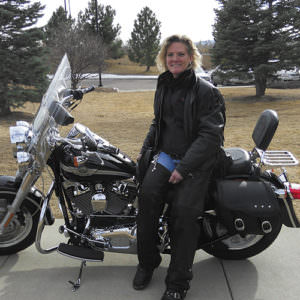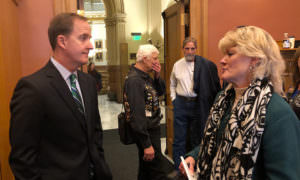victims for over 25 years.
Coloradans Organized for Responsible Driving

In February of 2016, Brian and Jacquie Lehner were riding their Harley-Davidson on Highway 83 near Franktown when an oncoming driver crossed the double-yellow line and hit them head-on. Both of the Lehners were killed. The driver, Athina Munoz, was found by police to be texting while driving, and she was also high on multiple substances.
Susan Dane was friends with the Lehners, having met them through her Harley-Davidson Chapter in Parker.
“The summer after they died, I told our Chapter members, ‘Something good has to come out of this!’” says Susan. “I looked up the penalties for texting and driving in Colorado and discovered that it was only $50 and one point. We were all shocked and realized we had to get that changed.”
Dane understood that Colorado’s laws were not strict enough to make anyone change their habits, meaning more people could die due to texting and driving. But she didn’t know how to change laws. She had never been involved in any legislative efforts in her life.
Therefore, Susan and a few of the Lehners’ other friends requested a meeting with George Brauchler, the district attorney who had prosecuted Athina Munoz.
“He said we had two options to change the law,” says Susan. “Either we could create legislation and try to get it passed through the Colorado legislature, or we could try to get signatures on a petition and get it on the ballot. He told us legislation would probably easier.”
CORD Was Born
 Knowing this would take an organized, grassroots effort, Susan and several other motorcycle riders founded CORD: Coloradans Organized for Responsible Driving.
Knowing this would take an organized, grassroots effort, Susan and several other motorcycle riders founded CORD: Coloradans Organized for Responsible Driving.
“My role was to go out and find bills that had been introduced or laws that had passed in other states,” says Susan. “I discovered that there was a bill moving forward in Colorado that year! Senator Lois Court had introduced the bill, so I gathered a bunch of bikers to show up and testify on behalf of the bill.”
Susan laughs a bit when she thinks of that day. “When Senator Court saw us all walk in the room – all these motorcycle riders – she was afraid we’d be against the legislation because bikers are typically against more restrictive laws, such as helmet laws. But then we all started telling our stories and she realized we were on her side.”
CORD and Senator Court worked together to cross party lines and get a bill passed that year. It was a victory but, according to Susan, still not enough.
“It was a small victory,” says Susan. “We got the fines increased but it was a very hard law to enforce. Basically, the only way to get pulled over and ticketed is if you’re texting while driving, and you’re driving carelessly, and a police officer sees you.”
(Scott O’Sullivan of Rider Justice and The O’Sullivan Law Firm also testified at that first public hearing and has been working with CORD and Senator Court to pass stricter texting-while-driving laws.)
Sadly, a stricter bill was quickly killed in 2018. But everyone involved agreed that they had to keep trying in 2019. Their first goal was to expand awareness and support of their efforts.
“We got insurance companies, AAA, C-DOT, the bicycle communities and so many others involved,” says Susan. “So many people want safer roads!”
The 2019 bill made it through the Colorado Senate but was killed in the first House committee it faced.
“The opposition seems to come from a perceived profiling concern, and because not everybody can afford a Bluetooth-enabled car,” says Susan, who explains that she has hard data refuting the profiling concern, and that there are many ways to go hands-free in any car.
“We aren’t going away!” she proclaims, insisting that CORD and many others will be back for the next legislative session to get an impactful, habit-changing law passed.
“In my perfect world, I would like to see a fine of $500 and 4 points for the first offense, escalating from there for each additional offense,” she says. “This is just as bad as drunk driving! As a comparison, we have a $1,000 fine for littering!”
Want Safer Roads? Get Involved!
 Susan would love to hear from anyone interested in supporting CORD’s efforts, and she understands how intimidating it can be to join the legislative process.
Susan would love to hear from anyone interested in supporting CORD’s efforts, and she understands how intimidating it can be to join the legislative process.
“It’s an eye opener,” she says. “I’ve never done anything like this before. Social studies was not my cup of tea in school so I’m making up for it now. Honestly, it’s very interesting and I have seen how average people can make a difference.”
If you’d like to follow CORD’s work, visit them on Facebook: @ColoradansOrganizedforResponsibleDriving. You can also email Susan directly: sdane@caresynergynetwork.org
Free Consultation
Search For
Recent Articles
- Are all motorcycles created equal?
- Frequently Asked Questions about Personal Injury Attorneys
- How Do Personal Injury Attorneys Calculate Future Medical Expenses in a Car Crash Settlement?
- Ways to Increase Your Visibility When Riding Your Bicycle in Denver
- 5 Reasons to Hire a Personal Injury Attorney if a Loved One Is Injured
Categories
- Arvada
- Aurora
- Auto Accident eBook
- Auto Insurance
- Bicycle
- Bicycle/Motorcycle Accidents
- Bodily injury
- Car accidents
- Centennial
- Colorado
- Colorado Legislature
- community
- Concussion
- Denver
- distracted driving
- DUI Accidents
- Englewood
- Events
- Flood Insurance
- Fort Collins
- Highlands Ranch
- Hit and Run
- In The News
- insurance companies
- Lakewood
- Littleton
- Marijuana DUI
- Motorcycle Accidents
- Motorcycle Insurance
- Motorcycle Law eBook
- Motorcycles
- Newsletter
- Pedestrian
- Personal Injury Law
- Safe Driving
- Safety
- Scooters
- technology
- Thornton
- Tips
- Uncategorized
- vibrio vulnificus bacteria
- Videos
- Westminster
- Winter Driving
Archive
- March 2024
- February 2024
- January 2024
- December 2023
- November 2023
- October 2023
- September 2023
- August 2023
- July 2023
- June 2023
- May 2023
- April 2023
- March 2023
- February 2023
- January 2023
- November 2022
- September 2022
- April 2022
- March 2022
- February 2022
- January 2022
- December 2021
- November 2021
- October 2021
- September 2021
- August 2021
- July 2021
- June 2021
- May 2021
- April 2021
- January 2021
- December 2020
- November 2020
- October 2020
- September 2020
- August 2020
- July 2020
- June 2020
- May 2020
- April 2020
- March 2020
- February 2020
- January 2020
- December 2019
- November 2019
- October 2019
- September 2019
- August 2019
- July 2019
- June 2019
- May 2019
- March 2019
- February 2019
- January 2019
- December 2018
- November 2018
- October 2018
- September 2018
- August 2018
- July 2018
- June 2018
- May 2018
- April 2018
- March 2018
- February 2018
- January 2018
- December 2017
- November 2017
- October 2017
- September 2017
- August 2017
- July 2017
- June 2017
- May 2017
- April 2017
- March 2017
- February 2017
- January 2017
- December 2016
- November 2016
- October 2016
- September 2016
- August 2016
- July 2016
- June 2016
- May 2016
- April 2016
- March 2016
- February 2016
- January 2016
- December 2015
- November 2015
- October 2015
- September 2015
- August 2015
- July 2015
- June 2015
- May 2015
- April 2015
- February 2015
- December 2014
- November 2014
- October 2014
- September 2014
- July 2014
- June 2014
- May 2014
- April 2014
- March 2014
- February 2014
- January 2014
- October 2013
- October 2012
- September 2012
- August 2012
- July 2012
- February 2012
- August 2011
- March 2011
- October 2010